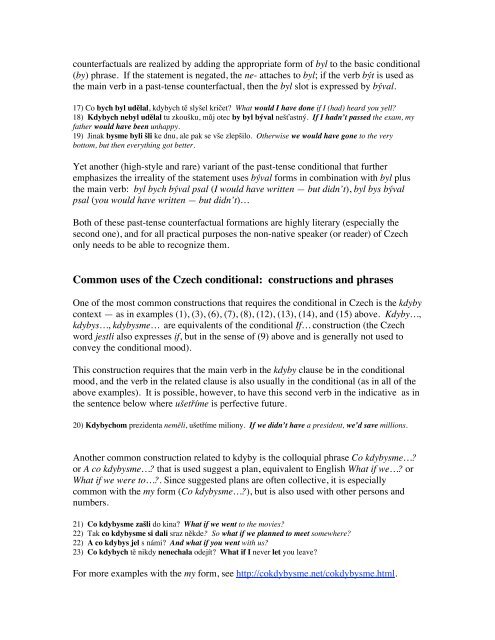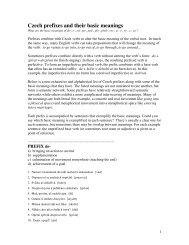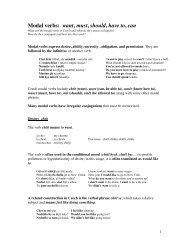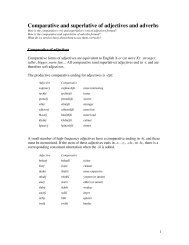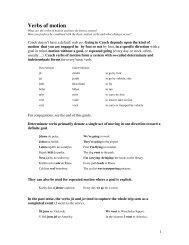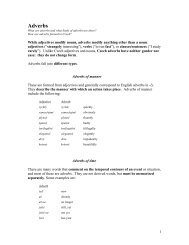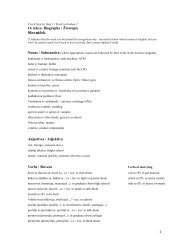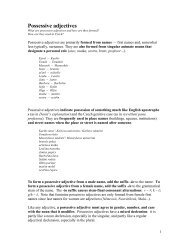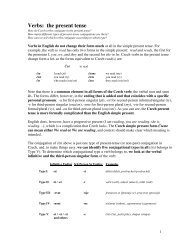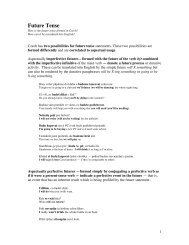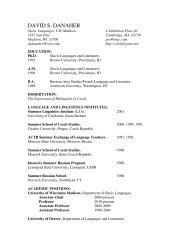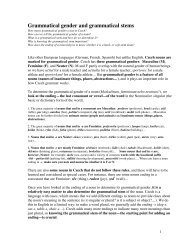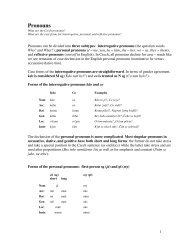Conditional Statements in Czech - Cokdybysme.net
Conditional Statements in Czech - Cokdybysme.net
Conditional Statements in Czech - Cokdybysme.net
Create successful ePaper yourself
Turn your PDF publications into a flip-book with our unique Google optimized e-Paper software.
counterfactuals are realized by add<strong>in</strong>g the appropriate form of byl to the basic conditional(by) phrase. If the statement is negated, the ne- attaches to byl; if the verb být is used asthe ma<strong>in</strong> verb <strong>in</strong> a past-tense counterfactual, then the byl slot is expressed by býval.17) Co bych byl udělal, kdybych tě slyšel kričet? What would I have done if I (had) heard you yell?18) Kdybych nebyl udělal tu zkoušku, můj otec by byl býval nešťastný. If I hadn’t passed the exam, myfather would have been unhappy.19) J<strong>in</strong>ak bysme byli šli ke dnu, ale pak se vše zlepšilo. Otherwise we would have gone to the verybottom, but then everyth<strong>in</strong>g got better.Yet another (high-style and rare) variant of the past-tense conditional that furtheremphasizes the irreality of the statement uses býval forms <strong>in</strong> comb<strong>in</strong>ation with byl plusthe ma<strong>in</strong> verb: byl bych býval psal (I would have written — but didn’t), byl bys bývalpsal (you would have written — but didn’t)…Both of these past-tense counterfactual formations are highly literary (especially thesecond one), and for all practical purposes the non-native speaker (or reader) of <strong>Czech</strong>only needs to be able to recognize them.Common uses of the <strong>Czech</strong> conditional: constructions and phrasesOne of the most common constructions that requires the conditional <strong>in</strong> <strong>Czech</strong> is the kdybycontext — as <strong>in</strong> examples (1), (3), (6), (7), (8), (12), (13), (14), and (15) above. Kdyby…,kdybys…, kdybysme… are equivalents of the conditional If… construction (the <strong>Czech</strong>word jestli also expresses if, but <strong>in</strong> the sense of (9) above and is generally not used toconvey the conditional mood).This construction requires that the ma<strong>in</strong> verb <strong>in</strong> the kdyby clause be <strong>in</strong> the conditionalmood, and the verb <strong>in</strong> the related clause is also usually <strong>in</strong> the conditional (as <strong>in</strong> all of theabove examples). It is possible, however, to have this second verb <strong>in</strong> the <strong>in</strong>dicative as <strong>in</strong>the sentence below where ušetříme is perfective future.20) Kdybychom prezidenta neměli, ušetříme miliony. If we didn’t have a president, we’d save millions.Another common construction related to kdyby is the colloquial phrase Co kdybysme…?or A co kdybysme…? that is used suggest a plan, equivalent to English What if we…? orWhat if we were to…?. S<strong>in</strong>ce suggested plans are often collective, it is especiallycommon with the my form (Co kdybysme…?), but is also used with other persons andnumbers.21) Co kdybysme zašli do k<strong>in</strong>a? What if we went to the movies?22) Tak co kdybysme si dali sraz někde? So what if we planned to meet somewhere?22) A co kdybys jel s námi? And what if you went with us?23) Co kdybych tě nikdy nenechala odejít? What if I never let you leave?For more examples with the my form, see http://cokdybysme.<strong>net</strong>/cokdybysme.html.


